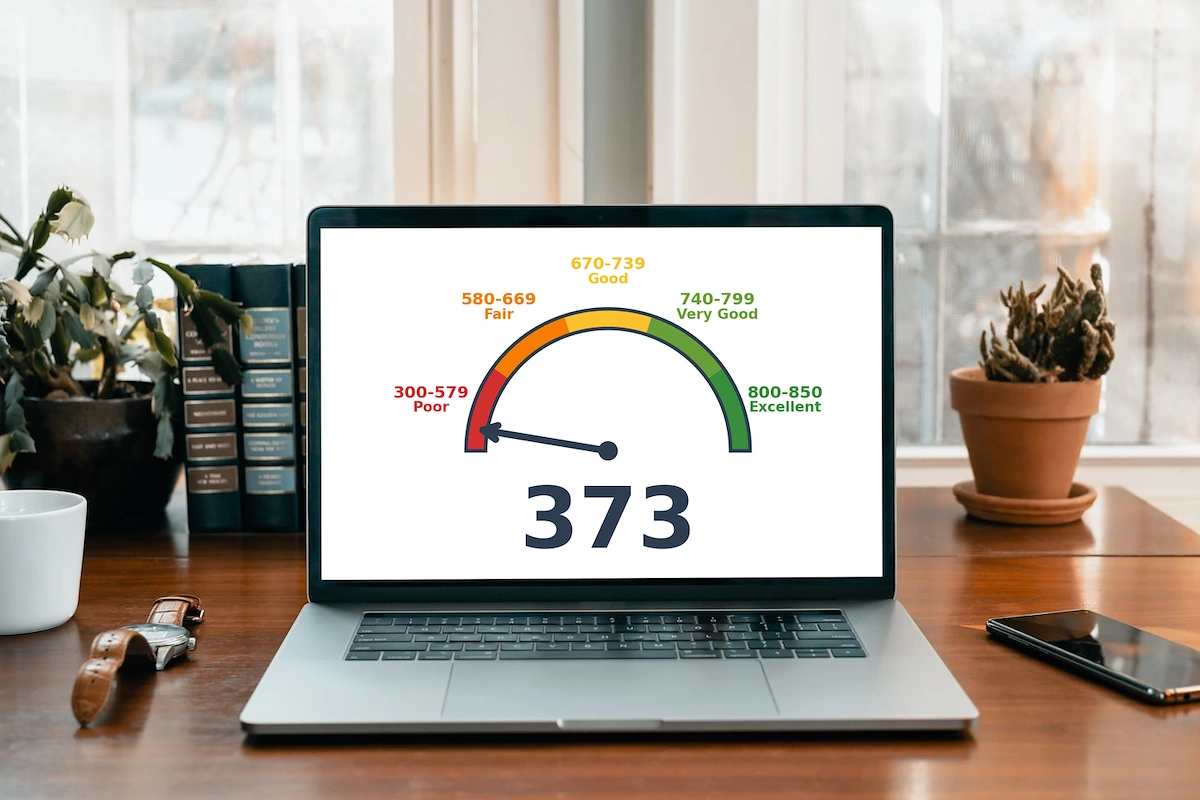
Kudos has partnered with CardRatings and Red Ventures for our coverage of credit card products. Kudos, CardRatings, and Red Ventures may receive a commission from card issuers. Kudos may receive commission from card issuers. Some of the card offers that appear on Kudos are from advertisers and may impact how and where card products appear on the site. Kudos tries to include as many card companies and offers as we are aware of, including offers from issuers that don't pay us, but we may not cover all card companies or all available card offers. You don't have to use our links, but we're grateful when you do!
373 Credit score: What You Need to Know in 2026
July 1, 2025


TL;DR
A 373 credit score provides a clear starting point and a significant opportunity to build a stronger financial foundation. This score falls into the "Poor" FICO category, which means there are straightforward steps you can take to begin improving your credit profile.
What Does a 373 Credit Score Mean?
A credit score of 373 places you squarely in the "poor" range of the FICO scoring model, which spans from 300 to 850. This score is significantly below the national average and indicates to lenders that you represent a very high credit risk. It generally points to a history of serious financial challenges, such as major delinquencies or accounts in collections.
Financially, a 373 score creates substantial obstacles. You will likely find it extremely difficult to be approved for new credit cards, loans, or mortgages. Any credit that is extended will almost certainly come with very high interest rates and strict terms. While this presents a difficult financial picture, it is a foundation from which you can begin to move forward.
Who Has a 373 Credit Score?
While age isn't a direct factor in credit score calculations, there is a strong correlation between age and average scores. According to 2023 average credit scores by generation, scores tend to improve with age. Here is the breakdown:
- Generation Z (ages 18-26): 680
- Millennials (ages 27-42): 690
- Generation X (ages 43-58): 709
- Baby Boomers (ages 59-77): 745
- Silent Generation (ages 78+): 760
Credit Cards With a 373 Credit Score
A credit score of 373 is considered very poor, placing you in the highest-risk category for most lenders. Consequently, obtaining a traditional unsecured credit card will be extremely challenging, as most issuers will likely deny your application outright. If you do manage to get approved, it will almost certainly be for a secured credit card that requires a cash deposit and comes with high interest rates and fees.
Kudos uses AI-powered tools to help you find a suitable credit card from its database of nearly 3,000 options based on your unique financial needs. Its features provide personalized recommendations and can offer insights into how applying for a new card may impact your credit score, ensuring you make an informed choice.
Auto Loans and a 373 Credit Score
A 373 credit score places you in the deep subprime category, making it difficult but not impossible to get an auto loan. You can expect to face the highest interest rates and least favorable terms because lenders see this score as a significant financial risk.
Based on an Experian market report for Q2 2025, here is how average auto loan rates break down by credit score:
- Super-prime (781-850): 5.25% for new cars, 7.13% for used cars
- Prime (661-780): 6.87% for new cars, 9.36% for used cars
- Non-prime (601-660): 9.83% for new cars, 13.92% for used cars
- Subprime (501-600): 13.18% for new cars, 18.86% for used cars
- Deep subprime (300-500): 15.77% for new cars, 21.55% for used cars
Mortgages at a 373 Credit Score
With a 373 credit score, traditional mortgage options are virtually nonexistent. According to current mortgage requirements, even the most lenient government-backed loans, like FHA loans, require a minimum score of 500. A score this low falls well below the threshold for any standard home loan, meaning your application would almost certainly be denied by conventional, FHA, VA, and USDA lenders.
Even if you found a highly specialized subprime lender willing to consider your application, the terms would be severe. You would face extremely high interest rates, a substantial down payment requirement, and strict manual underwriting where every detail of your financial history is scrutinized. These factors dramatically increase the cost of borrowing and severely limit your purchasing power.
What's in a Credit Score?
Figuring out what goes into your credit score can feel like trying to solve a complex puzzle, but it generally boils down to a handful of key elements. The most common factors include:
- Your payment history, which tracks whether you pay your bills on time, is the most significant factor.
- Credit utilization, or the amount of credit you're using compared to your total available credit, also plays a major role.
- The length of your credit history demonstrates your experience with managing credit over time.
- Having a healthy mix of different types of credit, such as credit cards and installment loans, can positively impact your score.
- Finally, recent credit inquiries, which occur when you apply for new credit, are also taken into account.
How to Improve Your 373 Credit Score
While a 373 credit score presents a challenge, it is possible to improve it, with most people seeing meaningful changes within three to six months of consistent effort. Rebuilding your credit requires establishing positive financial habits over time. Here are four actions you can take to begin raising your score:
- Apply for a secured credit card. Since a low score makes it difficult to qualify for traditional credit, a secured card requires a cash deposit as collateral, making approval easier. Using it for small purchases and paying the bill on time establishes a positive payment history, which is the most important factor in your score.
- Become an authorized user. Ask a trusted family member or friend with a strong credit history to add you as an authorized user on one of their credit cards. Their long history of on-time payments and low credit utilization can be added to your credit report and may help improve your score.
- Monitor your credit reports. A very low score could be the result of errors or even identity theft that you are unaware of. You can obtain free reports and dispute any inaccuracies, which could provide an immediate boost if errors are corrected.
- Set up automatic bill payments. Your payment history is the single largest component of your credit score, so missing payments is highly damaging. Automating payments for all your bills ensures you are never late and consistently build a positive record.
To help manage your cards and maximize rewards as you rebuild your credit, consider using a financial companion like Kudos.
Unlock your extra benefits when you become a Kudos member

Turn your online shopping into even more rewards

Join over 400,000 members simplifying their finances

Editorial Disclosure: Opinions expressed here are those of Kudos alone, not those of any bank, credit card issuer, hotel, airline, or other entity. This content has not been reviewed, approved or otherwise endorsed by any of the entities included within the post.



































.webp)







